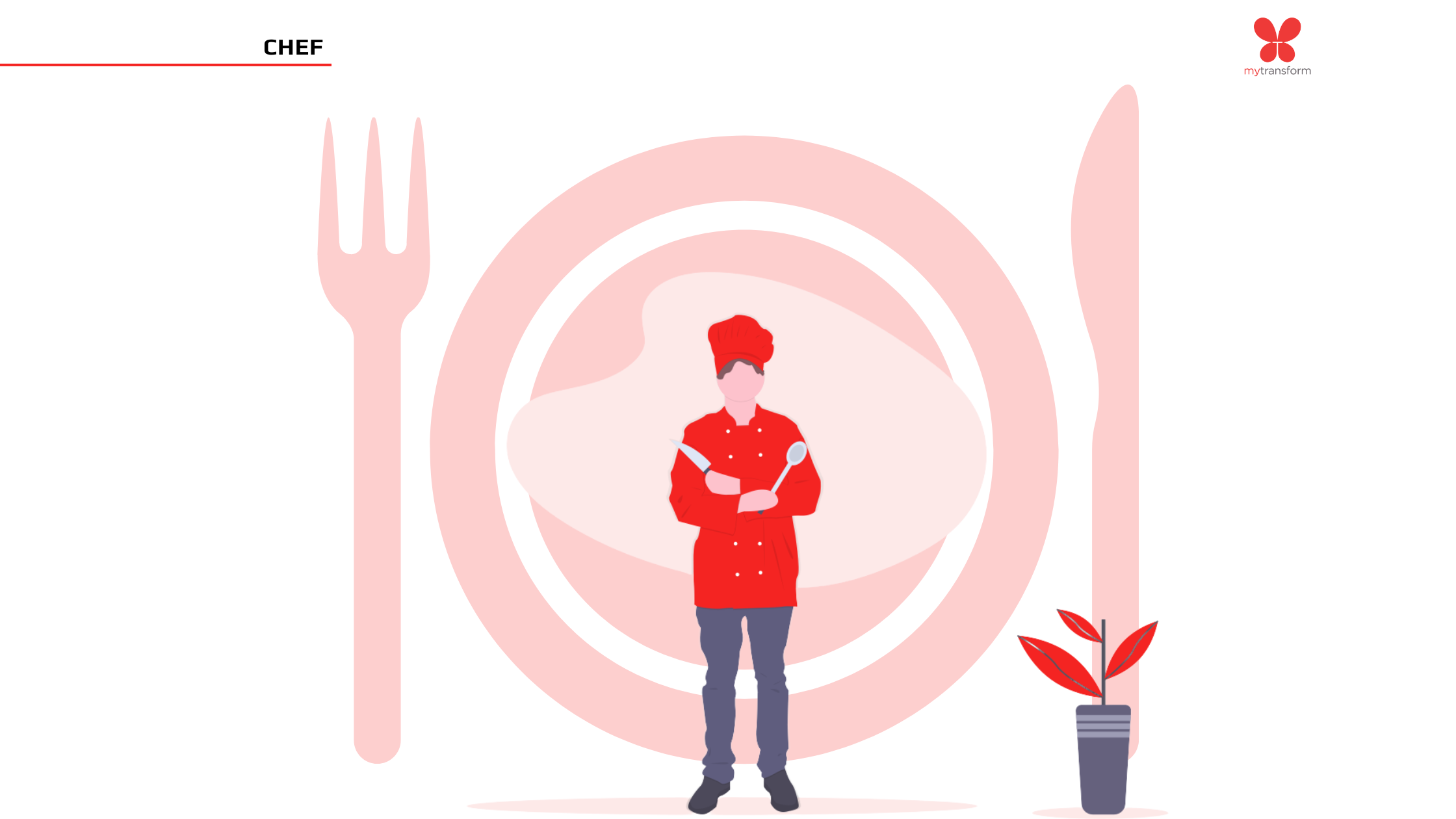
You don’t need any special training or education to become a Chef, but you will need some relevant professional experience to present on your resume.
Perhaps getting a degree might help you out as well.
With the hospitality industry growing every year, there is still a high demand for skilled Chefs. Getting started may not be as hard as you thought, and anyone of any age can become a Chef.
Let’s get started!
Table of Contents
ToggleWho is a Chef?
A Chef is a skilled professional cook and tradesman who is proficient in all elements of food preparation, generally specializing in a particular cuisine. Chefs can be found at restaurants and other food service establishments.
The title of “chef de cuisine,” which refers to the person in charge of a kitchen, is where the word “Chef” originated.
Types of Chef
Chefs typically hold higher-ranking positions in the kitchen. A restaurant will also typically have managerial and specialized Chefs. Each type of Chef can handle a wide range of tasks, from organization and training to menu development and recipe creation.
Different Types of Chefs are:
1. Commis Chef
The role of Commis Chef represents the starting point for a culinary career.
It’s similar to an internship, in which the junior Chef aids the experienced cooks in their education.
For the most part, commis Chefs are in charge of making sure their kitchen is always tidy and stocked with all the necessary ingredients and cooking implements.
A typical annual income of a Commis Chef is about INR 2.5 LPA.
2. Sous Chef
Sous Cooks, often known as Sauciers, are highly skilled Chefs who oversee the final plating of food.
Salad dressing, preparing sauces, monitoring gravy, etc., are all part of a saucier’s duties under the supervision of the Sous Chef and the Head Chef.
Approximately 3.5 LPA is their annual salary.
3. Pastry Chef
One of the most specialized types of cooks is the pastry Chef. They are self-employed and are in charge of making and presenting a wide variety of sweet treats.
A typical annual salary for them is INR 4 LPA. However, this number might vary widely by employment and location.
4. Senior Sous Chef
Working under the direction of the head Chef, the senior sous Chef is responsible for a variety of tasks, including purchasing and preparing products, planning the menu, and coordinating the logistics of food preparation and delivery.
Their Annual Income is between INR 4 and 5 LPA.
5. Head Chef
The Head Chef reports directly to the Executive Chef. In some establishments, though, they may be asked to step in as executive Chefs.
They are in charge of the smooth operation of the kitchen and everything related to it, including dealing with suppliers, supervising personnel, stocking the pantry, etc.
They might expect to take home between INR 6 and 7 LPA each year.
6. Executive Chef
The highest possible position for a Chef is that of “Executive Chef.” They are in charge of everything happening in the kitchen and supervising all of the personnel.
An executive Chef’s job description doesn’t include food preparation. They are responsible for overseeing the entire operation, from dish presentation and employee approval through menu development and final approval.
In India, the typical income for an executive Chef is between INR 10 and 11 LPA, with the potential for a rapid increase to INR 25 LPA.
Roles and Responsibilities of a Chef
The Roles and Responsibilities of a Chef are:
-
- Assuring that all food is of high quality and is served on time.
- Planning the menu while keeping the budget and seasonal ingredients in mind.
- In charge of all kitchen operations.
- Coordination of kitchen staff and assistance as needed.
- Staff must be trained to prepare and cook all menu items.
- Taking inventory of ingredients and equipment, as well as placing orders to replenish supplies.
- Enforcing kitchen safety and sanitation standards.
- Develop new recipes to keep the menu interesting.
- Keeping abreast of industry developments.
- Receiving feedback and making necessary improvements
Eligibility to Become a Chef
Some of the fundamental requirements for becoming a Chef are listed below for your convenience.
-
- To be eligible for degree programs such as BA in Culinary Arts, Bachelor of Hotel Management (BHM), Bachelor of Catering Technology, and Culinary Arts, students must complete 10+2. (BCTCA).
-
- A designer Chef should know the basics of this field so that he or she can do his or her job as well as possible.
-
- There are specific short and long programs available for this, which must be completed.
-
- The National Test Agency administers the NCHMCT JEE for admissions to various IHMs, State Government, and PSU-affiliated institutions.
-
- Graduates of the tenth grade can enroll in degrees and certifications at a limited number of institutions and universities.
-
- Examinations to determine admission into hotel management programs and schools are held on a yearly basis at both the national and state levels.
How to Become a Chef in India? – Step-By-Step Guide
In order to have an enjoyable and stress-free educational experience while studying to become a Chef, there are a number of courses and processes that need to be completed.
The following section will walk you through the prerequisite training and education that must be completed in order to work in the culinary industry as a Chef.
1. School Level Preparation:
After passing class tenth, there is no specific stream that must be studied or followed in order to become a Chef. Culinary skills are typically learned as a hobby, so candidates from any field can apply for the Chef course.
2. Becoming a Chef After 12th:
Just after the successful completion of class 12th, the following steps and courses must be completed for your convenience.
Aspiring candidates can pursue Undergraduate Hotel Management Courses, Cooking Courses, and other culinary courses such as B.A. Culinary Arts, among others. These courses are available at a number of colleges across the country.
3. PG Level Preparation:
In general, any candidate aspiring to be a Chef should have an undergraduate degree. Some students, however, prefer to pursue Postgraduate Courses as well.
4. Chef Courses:
The best part about becoming a Chef is that there are no limits on the courses and education you can take. Different institutes and colleges offer certificate courses, undergraduate degree programs, short-term diplomas, postgraduate specializations, and doctoral-level degrees.
5. BA in Culinary Art:
Full-time program for three years: The minimum requirement is 10+2 or an equivalent, with a score of at least 50% on the qualifying exams.
Similar Courses:
-
- Bachelor of Hotel Management (BHM) in Culinary is a full-time graduate course that lasts three years. To be eligible, you must have completed 10+2 with science subjects. Admission is based on merit and tests given at the beginning.
-
- B.Sc. in Catering Science and Hotel Management: This is a three-year undergraduate course that is broken up into semesters. The minimum requirement is 10+2, and entrance exams are used to decide who gets in.
-
- Certificate in Food Production and Patisserie is a short course that lasts between 6 and 18 months. SSC or 10th grade with English is required.
-
- PG Diploma in Culinary Arts: Some Culinary and Hotel Management colleges offer a one-year full-time post-graduate diploma course. For admission, candidates must have a bachelor’s degree and pass an entrance exam.
Career Opportunities for a Chef
The career opportunities for a Chef are:
-
- Consultants work with restaurant owners to develop menus and assist with restaurant design.
-
- Food and Beverage Managers will be in charge of restaurant and hotel chains.
-
- Food critics and journalists who write for magazines or news organizations
-
- Photographers and food stylists for magazines, books, catalogs, and advertising.
-
- Overseeing the kitchen and cooking for restaurant patrons in a full-service restaurant.
-
- People on special diets are increasingly turning to home meal delivery services.
-
- Hotel Dining Rooms and Restaurants – Many hotels have dining rooms and restaurants.
-
- Catering for airports, schools, hospitals, colleges, and correctional facilities.
-
- Production and sale of instructional videos for continuing education.
-
- Individuals or families can hire a personal Chef.
-
- R&D for manufacturers who are creating new foods or product lines
-
- College and culinary school instructors
Chef Salary (freshers, average, experienced, etc.)
| Specialization | Average Annual Salary (INR) |
| Chef | 5.60 L |
| Executive Chef | 10.20 L |
| Sous Chef | 5.11 L |
| Pastry Chef | 4.09 L |
| Head Chef | 8.33 L |
Top Hotel Management Colleges in India
There are more than 347 colleges and universities in India that offer undergraduate and graduate courses in Hotel Management.
Of these, 209 are private colleges, 55 are public universities, and the other 83 are deemed colleges. They offer courses that can be taken full-time, part-time, or from afar.
| Name of the Colleges | Location | Average Course Fees (INR) |
| Institute of Hotel Management, Catering, and Nutrition | Delhi | 81,600 |
| Institute of Hotel Management | Bangalore | 96,613 |
| Parul University | Vadodara | 40,000 |
| International School of Hospitality and Tourism | Kolkata | 4,30,000 |
| Lexicon Institute of Hotel Management | Pune | 2,83,000 |
| DPMI Vocational institute | Delhi | 60,000 |
| Institute of Hotel Management Catering Technology & Applied Nutrition | Kolkata | 66,000 |
| Dr.Ambedkar Institute of Hotel Management Catering and Nutrition | Chandigarh | 1,22,000 |
| International Institute of Hotel Management | Pune | 1,31,000 |
| Christ University | Bangalore | 1,25,000 |
Best Chef Recruiters In India
The Best Chef Recruiters In India are:
-
- Marriott International, Inc
-
- Hyatt Hotels Accor Hotels
-
- ITC Group of Hotels
-
- The Leela Palace, Hotels and Resorts
-
- The Taj Group of Hotels
Pros & Cons
Pros:
-
- Excellent Compensation Package
- Creative Contentment
- The liberty to experiment and innovate
- The popularity of achieving celebrity standing
- Can begin your own food business
Cons:
-
- Normal working hours may be extended
- Physical Labor Required During the festival, the need for labor grows. Therefore it’s possible that you won’t be granted any off time
- Kitchens can be suffocating, which could be detrimental to health
- Always require strict quality control
Summary
-
- With the hospitality industry growing year after year, there is still a high demand for skilled Chefs, and the requirements for you to get started may not be as difficult as you thought; anyone at any age can become a Chef.
-
- Different Types of Chefs are:
-
- Commis Chef
-
- Sous Chef
-
- Pastry Chef
-
- Senior Sous Chef
-
- Head Chef
-
- Executive Chef
-
- To be eligible for degree programs such as BA in Culinary Arts, Bachelor of Hotel Management (BHM), Bachelor of Catering Technology, and Culinary Arts, students must complete 10+2. (BCTCA).
-
- Aspiring candidates can pursue Undergraduate Hotel Management Courses, Cooking Courses, and other culinary courses such as B.A. Culinary Arts, among others. These courses are available at a number of colleges across the country.
-
- Some Culinary and Hotel Management colleges offer a one-year full-time post-graduate diploma course. For admission, candidates must have a bachelor’s degree and pass an entrance exam.
-
- There are more than 347 colleges and universities in India that offer undergraduate and graduate courses in Hotel Management. Of these, 209 are private colleges, 55 are public universities, and the other 83 are deemed colleges. They offer courses that can be taken full-time, part-time, or from afar.
-
- Career Opportunities- Consultants work with restaurant owners to develop menus and assist with restaurant design.
-
- Developing new recipes to keep the menu interesting is one of the roles and responsibilities of a Chef.
Frequently Asked Questions
Depending on how long you go to culinary school, it can take anywhere from a few short months to four years.
When you sign up, you can choose from different options, and different things can affect how long your studies will take.
For example, it can take between 2 and 4 years to become a professional Chef.
In order to achieve success as a Chef in this industry, one needs several years of expertise in addition to a significant amount of hard work.
You can opt for these courses:
- Bachelor of Hotel Management (BHM) in Culinary.
- B.Sc. in Hospitality and Hotel Management.
- B.Sc. in Catering Science and Hotel Management.
- Certificate in Food Production and Patisserie.
- PG Diploma in Culinary Arts.
- BA in Culinary Arts.
People who are passionate about food have the opportunity to turn their interest into a rewarding profession by becoming Chefs.
In addition to that, a profession in the kitchen will give you the following benefits: The work is challenging and interesting, and there are many prospects for advancement and personal growth on a daily basis.
It is a career that provides a high level of job satisfaction.
₹10,000 to ₹15,000 per month. Once you gain some experience of about 10 years or so, you can expect better pay than this.
You can be above 30 and go to culinary school and start working as a line cook in restaurants.
₹10,000 to ₹15,000 per month. Once you gain some experience of about 10 years or so, you can expect better pay than this.
Some regular problems that Chefs face are:
- Foul odors from the sink or blockages caused by food residue are two of the most common kitchen issues
- Insufficient Counter Space
- Poor Ventilation Greasy Surfaces
- Messy Kitchen Space
- Storage Issues
- Malfunctioning Cabinets
- Inadequate Lighting
It’s not easy to be a professional Chef, and it takes a lot of time, energy, and commitment.
You will need to love it because the hours can be long and you won’t see many people, and kitchens are stressful places to work.
Certificate or degree in culinary arts, hospitality, or a related field; apprentice programs are common for aspiring gourmet Chefs.
Hotel Chef positions often need 40 to 45 hours of work per week, with two days off each week. It is common for hotel cooks to work morning shifts from 6 a.m. to 11 a.m., followed by an afternoon shift from 1 p.m. to midnight.
Here are the five most difficult things about being a Chef:
- Competition.
- Customer expectations.
- Staff Retention
- Staff Recruitment
- Sustainability.




